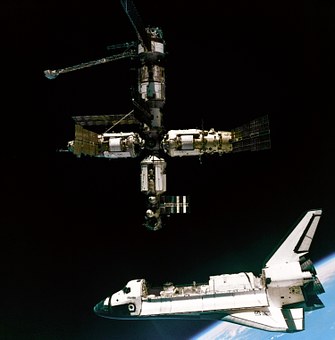Five decades after the Apollo moon landing, the possibility of space generating revenues is dawning. For a long time, the space industry has been a government affair, especially one with great geopolitical ramifications. Nevertheless, the ground is shifting as commercial viability continues to be realized.
Even as progress begins to emerge, investors still need to understand certain fundamentals of the space industry. In this quest, various questions arise; what is the space industry? What is the space economy? Having followed these fundamentals, one will easily appreciate the profit potential that lies in the global space economy.
Space Industry Explained
The space industry entails businesses that manufacture or market vehicles for launching space objects, ground equipment, and spacecraft. Other businesses that make up the space industry include those building components for spacecraft and other space vehicles. In terms of sectors, the space industry is categorized into the launch industry, ground support equipment, and spacecraft.
Under the spacecraft sector, a software-programming subsector, subsystem manufacturing subsector, satellite subsector, and space probes and rovers manufacturers subsector exist. On the other hand, ground support equipment entails gateways, mobile terminals, VSATs, and control stations, among other subsectors.
The launch sector is the narrowest space industry with just two subsectors; launching vehicle manufacturers and launching services providers.
Alternatively, one can look at the space industry as a stream. On the upstream, businesses are primarily focused on space exploration and launching objects into space. In this category, markets include the launch market and commercial satellite market. The downstream, on the other hand, entails businesses exploiting space technology and research.

So, What is The Space Economy?
The space economy includes all the players involved in the space industry. It means all of the upstream, midstream, downstream, and the end-users. Because the industry is still evolving, the space economy is always expanding. Today, major players in the space economy include manufacturers and operators of space systems and defense and national security agencies. On the commercial users, the maritime industry is a significant player in this economy. Others include the agribusiness industry, the environmental services industry, and the energy and minerals industry.
Alex Richter, an expert in the niche of finance and asset management shared with us the following data about how the space industry is growing:
“And the space economy is growing fast. As of 2019, the global space economy was worth $414.75 billion, according to The Space Report. Of this, 55.3% entails commercial space products and services. Commercial infrastructure and support services make up 24.0% of the global space economy. Lastly, government expenditure on space programs (the US and Non-US space budgets) make up 20.7% of the global space economy.”
Alex Richter said that specifically, the satellite industry is experiencing phenomenal growth. “In the five years from 2014 to 2018, the global satellite industry recorded ever-increasing revenues. While revenues in 2014 were $246 billion, the value increased to $277 billion in 2018”
And Alex added that a breakdown of this growth presents an exciting picture, especially for the launch industry. “In 2018, SIA figures show that the launch industry registered the most significant jump in revenues at 34%. The US alone accounted for 37% ($2.3 billion) of the 2018 revenues for the launch industry. Satellite manufacturing’s revenues, contrarily, jumped by 26% $19.5 billion. US-based businesses generated $ 11.5 billion of the revenues.”

Investing in The Space Economy
From the foregoing, the US has the most attractive space stocks. The businesses in whose stock one can invest operate in three sectors of the space industry. In the launch industry, one can find SpaceX, although the Elon Musk-founded company also produces rocket engines. SpaceX is an incredible company that is blazing the trail insofar as the commercialization of space exploration goes. Unfortunately, the company is not yet available for retail investing.
SpaceX’s recent feats are shining the spotlight on publicly traded companies such as Virgin Galactic, which have similar interests as SpaceX. Alternatively, an investor could go for Aerojet Rocketdyne or Maxar Technologies Inc (NYSE:MAXR), both trading on the New York Stock Exchange (NYSE).
The satellite manufacturing industry consists of companies like Airbus SE (EPA:AIR) (OTC:EADSY), Boeing Co (NYSE:BA), Avio SpA (BIT:AVIO), Aerojet Rocketdyne Holdings Inc (NYSE:AJRD), and more. Finally, some other companies exploit space technologies, and they include Trimble Inc (NASDAQ:TRMB), DISH Networks Corp (NASDAQ:DISH), AT&T Inc (NYSE:T), and more.
Besides the pure-plays, defense contractors such as Boeing, Raytheon Technologies, Northrop Grumman Corporation (NYSE:NOC), and more have interests in the space economy. All of these giants are available to retail investors. The companies’ operations cut across the space industry. Some like Boeing have subsidiaries in the launch industry, while Northrop Grumman operates in the commercial satellite market and launch market via subsidiaries.
The space economy is still nascent, and inherent risks are immense. As the industry evolves and revenue possibilities increase, more prominent companies will join the band. At the same time, the small and mostly private pure-plays might want to go public. Until such a time, one can invest in the likes of Boeing.
- Broker
- Min Deposit
- Score
- Visit Broker
- Award-winning Cryptocurrency trading platform
- $100 minimum deposit,
- FCA & Cysec regulated
- 20% welcome bonus of upto $10,000
- Minimum deposit $100
- Verify your account before the bonus is credited
- Fund Moneta Markets account with a minimum of $250
- Opt in using the form to claim your 50% deposit bonus
Learn to Trade
Never Miss A Trade Again

Signal Notification
Real-time signal notifications whenever a signal is opened, closes or Updated

Get Alerts
Immediate alerts to your email and mobile phone.

Entry Price Levels
Entry price level for every signal Just choose one of our Top Brokers in the list above to get all this free.



